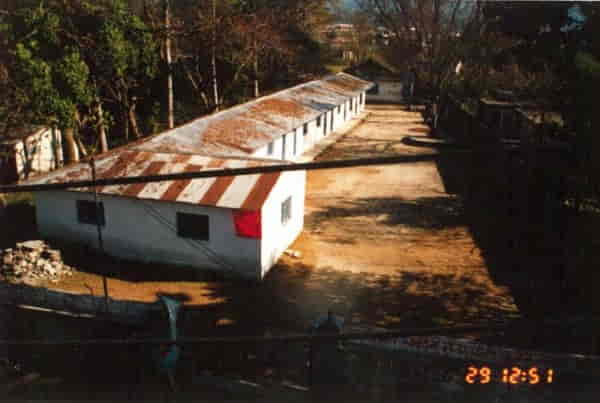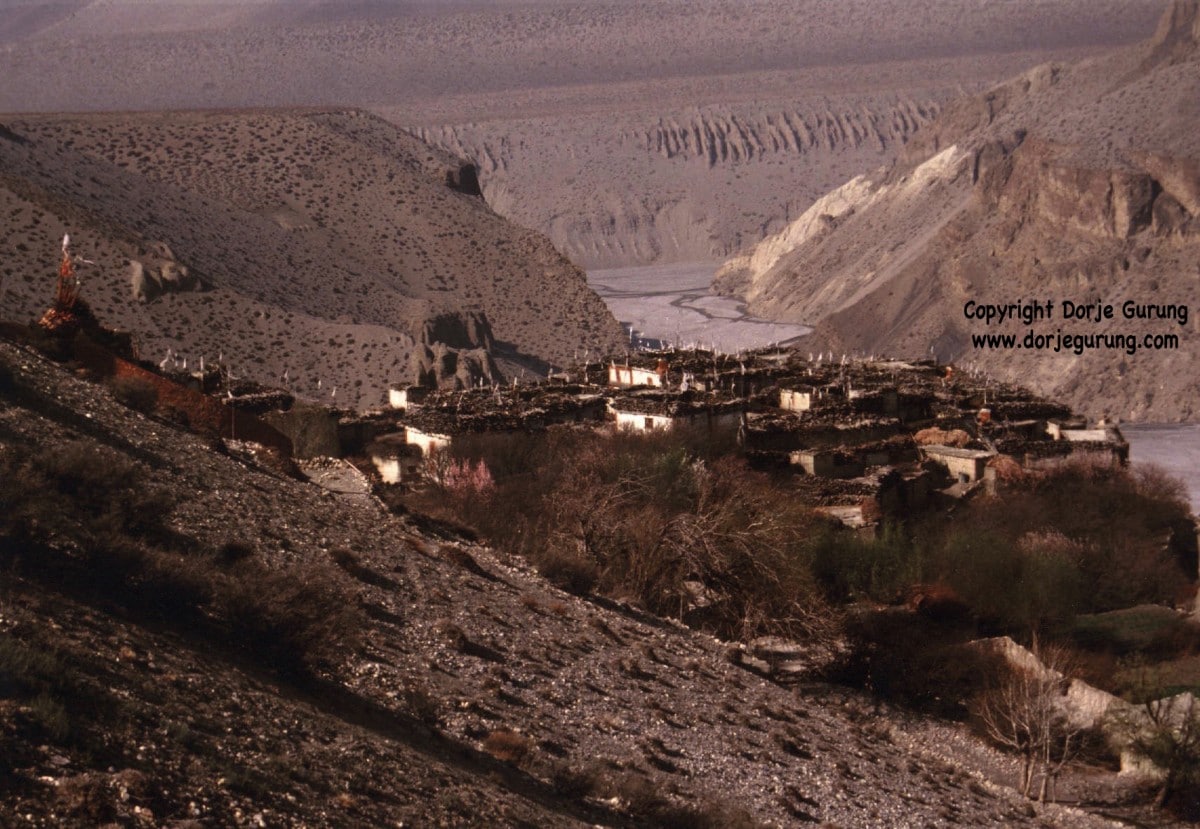My grandfather would piggyback me to and from school in Pokhara.
The barren and high-altitude desert of the little village of Tangbe, in Mustang district, as you can see above, where I was living as a young child with my grandfather (and other relatives), had no school. The story goes, my parents wanted me to join them in Pokhara so that they could send me to school to learn to “read and write.” But my grandfather refused to let me join them, relenting only after repeated requests. And relent, boy did he! He himself took me to Pokhara and to school, every day until he had to leave for the village.
Ganeshsthan, the “school” was a small room with a single teacher. But with movement of family residence, I moved school, twice and ended up at Bal Jyoti.
A teacher at Bal Jyoti changed my destiny!

Bal Jyoti is a small primary school on the Northern end of the beautiful city. (Though I took the photo of the school in 1998, that’s how the school looked even in the seventies when I was a student.) At the time, it was known in some circle affectionately, and in others pejoratively, as “Bora School” (Bora = Sack in Nepalese). You see, the students had to take along a sack to sit on the dirt-floor classrooms as there weren’t any benches, forget chairs!
The story goes that a teacher, recognizing my potential, took my dad aside and advised him to put me in a good private school in Kathmandu.
“If you let your son continue his studies at government schools, nothing will come of his potential,” were apparently his words.
No one in my family had been to school. Most of my older cousins had never made it to school. Two or three had learned to read and write, a little. Not a single one of them had completed primary education, let alone secondary.
At the time, most Nepalese valued, at the very least, literacy. When it came to academic qualifications however, the extremely hierarchical and stratified society ensured that those from the lower strata wouldn’t see, understand and recognize its importance. All evidence made it clear to everyone occupying the lower rungs that, when it came to making oneself worthy or successful, what mattered first and foremost was “source and force” (wealth and connection). And then came education, maybe! Social mobility was not a characteristics of Nepalese society. At least not upward movement!
Regardless, heeding my teacher’s advice, my father took me to the capital, in search of private schools, that he knew nothing about. Luckily, I ended up at St. Xavier’s Godavari School, a Jesuit boarding school, one of the premier schools at the time. That alone made my grandfather the proudest man in the village. I was attending not just any school, but a BOARDING school in KATHMANDU, the capital. He had never even been to the city! But that wasn’t enough for me!
I was in fifth grade when I decided I would make more of a difference, to myself and others, through education. I would be a “thulo manche” (“an important/successful/good person”).
I knew all about the hurdles of further education at home and about scholarships for further education abroad. I was aware of the fact that scholarships provided by, or through, the government would never be available to me. However, I learned, from the Jesuit teachers, that merit-based scholarships to institutions of higher education in the United States were available to all, to any student. Not only that, they would bring visiting former students, either returning from their education, or on vacation, to the class to speak to us. Their fantastic stories of college life and education in the US had me hooked. (When I was in primary school, there were no TVs and videos in Nepal.) But I didn’t tell any of my family members nor any adults from my community about education in the US as it was something unheard of. I didn’t want anyone laughing in my face!
However, I had a very good understanding of what I needed to do to qualify for those scholarships. An all-rounder — good in studies as well as having an extensive involvements in extra-curricular activities and social work — was what one had to be. Furthermore, one had to do well in three aptitude tests: TOEFL (Test of English as a Foreign Language), SAT I and SAT II (though in those days the two were called SAT and Achievement Tests respectively).
So I drowned myself in books.
In spite of pressures to quit school, I applied myself in every aspect of education, especially reading. I read voraciously, starting with the Hardy Boys and Nancy Drew series in the last years of primary school. Godavari School had a library, an incredible luxury in schools! Moving to secondary school, when most of my friends and cousins from my village had dropped out and given up on education all together, I found a second source of books–British Council library–and drowned myself in the worlds created by authors such as Alistair MacLean and Robert Ludlum, among others. Reading, more than most other academic activities, served me very well.
Then the scholarships I had worked for came.
Following SLC and O’Level studies (a defunct British examination), I won a scholarship, sponsored by the Italian government, to study at United World College of Adriatic in Italy. (The non-politicized nature of the selection process meant that I qualified for it.) Following two years in Italy, I continued on to Grinnell College in the US for further studies, also on pretty much a 100% financial aid package.
But a large percentage of marginalized and disenfranchised children in Nepal don’t get anywhere near as far in their academic careers. The systems in place ensures that! The old, myopic, corrupt and opportunistic leaders and politicians will remain as they are and will continue to try to ensure the status quo. The rest of us, however, can change, can change the system…for the better…for the benefit of us all!
What do you think?


Mate, I always love your stories! Real stories, unadulterated ones! Your stories are like a conduit to other lives, other ways of being, other ways of seeing the world. You bring all your beliefs, learnings, convictions, attitudes and experiences to the process of interpreting and perceiving the world. Certainly catching a glimpse of your life experiences and frame of reference. The viewer is allowed to become a part of the view, right? Job well done is better than well said! Dojee’s doing…keep going!
Chandra, thanks for the kind words!
Dorje, I heard about your situation in Qatar through ISR…I am glad that you are free and know that you will never give up…I wish you all the luck & perseverance….Doug
Dear Doug,
Thank you!
Dorje, I’m so glad to hear that you’re free and back in Nepal! I was in Kagbeni nearly 20 years ago, but until I came across your blog last week, never realized that you were from Mustang. It must be good to be home! I wish you much success in whatever endeavor you pursue next.
Dear Darren,
Yes indeed it’s great to be back home! Thank you for you well wishes.
Dorje my thoughts are with you…best of luck in your currant situation. Judy, a colleague from Baku
Dear Judy,
Thank you! Because of people like you around the world I am a free man today!
(Visited 311 times, 178 visits today) Dorje, What you have write should be an inspiration to many. I only hope that I and others can continue the drive forward to make a change for those who are less fortunate. I truly believe that we are all responsible for change. You, through unnecessary suffering, can hopefully guide us to change the system has been refused/unachieveable to others.
Dear Lily,
What I went through the last ten days and what people like yourself accomplished (helping me secure my freedom) had made my resolve, to be an agent of change in Nepal, even stronger!